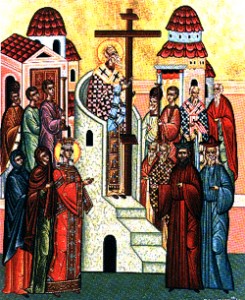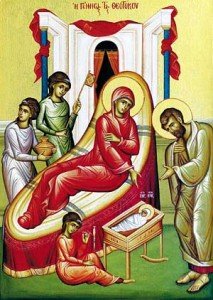On September 29th, on the Sunday after the Exaltation of the Cross, Archpriest Igor Tarasov celebrated Divine Liturgy at St. George Church. Following the reading from the Gospel he preached a homily:
“On the Sunday after the feast of the Exaltation of the Cross we again are given a special set of readings from the Scripture. Today’s Epistle is telling us again about the meaning of being crucified with Christ. St. Paul says, “I have been crucified with Christ…” (Gal. 2, 20). It does not mean that St. Paul became physically crucified on the cross as Jesus. It means that his sinful passions and desires have been crucified. It is a crucifixion of his flesh, of the fallen and corrupt nature. It is a life in faith, not in flesh. And as St. Paul teaches, the result of such a crucifixion is that Christ lives in us.”
St. Paul utters, “It is no longer I who live, but Christ lives in me” (Gal. 2, 20). If we live by faith in Jesus Christ, it is no longer we live under the dominion of sinful passions, but under the power of Christ. The grace of God is penetrating our nature, thus Jesus Christ lives in us.
There is a story about a monk who knocked on the door of heaven seeking entrance. A voice asked, “Who are you?” The monk replied, “It is I”. The door did not open. After many years he tried again. As he knocked, the same voice asked again, “Who are you?” “It is I”, answered the monk. The door remained closed. Finally, he came back after many years. The monk became older and wiser as a Christian. When the same voice asked him, “Who are you?” the monk replied, “You in me”. And the voice said, “Come in”.
“If we ask who is a good Christian, we may have many answers. We may say that it is a person who is baptized, who believes in Jesus Christ, who goes to the church, who receives the Sacraments, and so on. This is true. However, these answers are not complete because they do not say the most important thing about a Christian: he is one in whom Christ lives. “You in me!” “It is no longer I who lives, but Christ lives in me”. Our Lord expresses this when He said to His disciples, “I am the true Vine, you are the branches. He who abides in Me, and I in him, bears much fruit; for without Me you can do nothing” (Jn. 15, 5).”
“These words of Christ telling that without Him we cannot do anything, remind us that our Christian religion is not just doing the works of a certain religious law. St. Paul warns the Galatians in today’s Epistle that “a man is not justified by the works of the law but by faith in Jesus Christ “(Gal. 2, 16). Our works according to the law of God cannot save us if we do it without a living faith in Christ, without Jesus living within us. On the other hand, our faith alone also cannot save us if we do not live according to that faith. The Jews thought they can be justified only by living by the law of Moses, and the Protestants tend to think that they can be saved only by confessing faith in Jesus Christ. They both are mistaken. We can be saved by faith and by the works according to our faith. If Christ lives in us, we have faith and we deal according to it.”
“People living in Christ are shining by His light. They look like a home, a palace which becomes illuminated when its master is hosting a royal family. If only a few people are home, just a small light filters through the windows. When friends come, many lamps are lit and the palace becomes beautiful. But when the royal family is visiting, the entire palace becomes illuminated. Some people may be described in that way. They have a shining personality, so seeing them you can say that they entertain a Royal Guest”
“We should say that we are no palaces, but temples of the living God. When the Royal Guest is present within, He gives us joy, peace, love and light to our lives. Especially it happens when we worthily receive this Guest in the holy Communion. For He said, “He who eats My flesh and drinks My blood abides in Me, and I in him” (Jn. 6, 56). But that reception has to be proper and worthy, otherwise Christ will come but will not stay. Let us try to live a Christian life, to crucify our flesh with its sinful passions and desires and to abide in Christ, so we may also be able to say, “It is no longer I who live, but Christ lives in me”!”
Following the Liturgy Rector and parishioners venerated the Precious Cross.
After the service we had our coffee hour with delicious refreshments.


